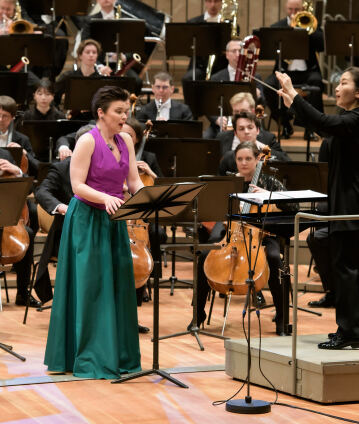Schoenberg’s “Erwartung” and Rachmaninov’s Third with Eun Sun Kim

This concert shows how different musical worlds were at the beginning of the 20th century. Arnold Schoenberg’s monodrama Erwartung (soloist: Ausrine Stundyte), an intense atmospheric painting between anxiety and hope, is innovative. Sergei Rachmaninov’s Third Symphony, on the other hand, is marked by a melancholy look back. The South Korean conductor Eun Sun Kim, music director of the San Francisco Opera, made her debut with the Philharmoniker.
A dramatised nightmare: the libretto for Erwartung was written by Marie Pappenheim, a writer who was a close friend of Schoenberg’s circle and the wife of a Viennese psychologist of the Freudian school. It presents a monologue full of fears, expectations and horrors in which the protagonist, wandering through internal and external labyrinths, cannot escape her own psychological turmoil – and which ends in catastrophe: a kind of “patient protocol” between hallucination and hysteria.
Schoenberg created a psychogram-like setting full of Expressionist tension, which follows the text seismographically and depicts the physiognomy of the subconscious: a precursor to Alban Berg’s Wozzeck, in which the sensitivities of modern man are described in exemplary fashion.
A quarter of a century later, Sergei Rachmaninov presented a very different kind of psychogram in his Third Symphony. Its often melancholy themes and motifs are unmistakably characterised by Russian melodicism. In 1917, the composer had left his homeland for good after the Bolsheviks seized power. In exile in America, he was plagued by homesickness for the rest of his life. The finale of the symphony is often interpreted as a reflection of a busy present – at the same time, the medieval Dies irae motif is heard, which Rachmaninov had already used in numerous earlier works. As a result, the composer’s artistically complex late work reveals two layers: a retrospective view of a past, vanished world, and a critical examination of the American way of life in the era of industrialisation.
© 2024 Berlin Phil Media GmbH
Related interviews